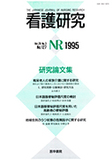Japanese
English
- 有料閲覧
- Abstract 文献概要
- 1ページ目 Look Inside
- サイト内被引用 Cited by
日本語版便秘評価尺度(CAS)を用いて,健康老人327名と痴呆のない障害老人(いわゆる寝たきり老人)56名の計383名の高齢者(男92名,女291名;平均年齢76.9歳,60〜98歳)の排便習慣を検討した。その結果,高齢者では評価期間によるCAS得点の差はなかった。また,CAS得点の性差および年齢差もみられなかった。しかし,健康老人と障害老人を比較すると,後者のCAS得点が有意書高かった(p<0.01)。また,日常生活自立度が低いとCAS得点が高くなる傾向がみられた。さらに,障害老人の介護者が行なった他者評価によるCAS得点と本人のそれは強い相関関係を示した(r=0.70〜0.75)。以上の結果から,生殖年齢を過ぎた高齢者では,排便習慣に男女差がなくなること,健康者では年齢と便秘傾向とは無関係であること,そして,障害老人では日常生活の自立度(活動度)の低下が便秘を招来する可能性のあることが示唆された。
We aimed to investigate the bowel habits of elderly persons by the Japanese version of the constipation assessment scale (J-CAS Ver. 2), which has three types of answer forms (three different assessment terms : during the past some days, during the past one week, and during the past one month), revised and developed from the original tool (McMillan & Williams, 1989). 383 elderly persons (92 males and 291 females ; 76.9±7.9yr.) completed the scale. 327 were healthy but 56 were disabled. The latter need some or much help to accomplish their activities of daily lives. No significant difference was seen between each two sets of scores out of three kinds of CAS which have different answer froms described above, between those of the genders, nor ages. However, the CAS score of the disabled elderly was significantly higher than the healthy ones (p<0.01). Besides, the lower the ability of self-care was, the higher the CAS score was. And the scores of CAS, completed by one of the main family members of the disabled elderly on their behalf, correlated with those of their own scores (r=0.70〜0.75). From these results, it is suggested that the bowel habits of the female elderly whose menstrual cycles had finished become similar to those of males, that there is no correlation between age and constipation in the healthy elderly, and that the decline of the self-care ability could cause constipation in the disabled elderly.

Copyright © 1995, Igaku-Shoin Ltd. All rights reserved.


